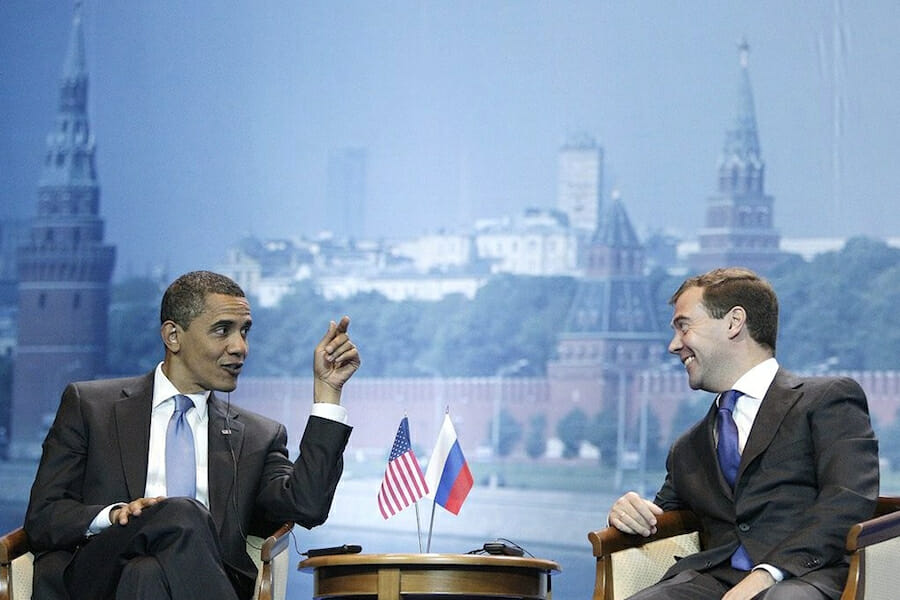
Politics
GOP and Putin Find Common Ground: The Cold War
Republican Presidential primary front-runner Mitt Romney declared Russia “without question, [is] our No. 1 geopolitical foe.” That statement accompanied a larger criticism lobbied against President Obama and his hot mic slip last week with Russian President Dimitry Medvedev at the Seoul Nuclear Summit. During a press conference, Obama was overheard asking Medvedev, the soon-to-be Prime Minister, for more time and space regarding the U.S. missile defense system in Europe, stating that he would “have more flexibility” after the November elections.
The days that followed have been a pile on by the Republican Party, who have been longtime critics of the President’s “Reset” diplomacy with Russia. Many on the right have called the incident in Seoul as further evidence of the President’s weakness on security and over willingness to compromise on U.S. interests and her allies. Furthermore, the ever-elongating Republican primary dogfight has only made Obama’s gaffe fodder for political conservative punditry.
And even after two decades have passed since the fall of the Soviet Union and the end of the Cold War, rhetoric of Moscow as once again an untrustworthy partner that should be held at an arms length and with a wary eye have resurfaced.
Second up Republican Presidential candidate Rick Santorum’s campaign also jumped at the opportunity to jab at Obama. On the campaign trail in Wisconsin, the former Senator likened any compromise with Russia over the missile defense system as letting them “have their run of the table because America’s no longer in the business of protecting ourselves and our allies.”
Republican house majority leader Congressman John Boehner sent an open letter to the President expressing concern of the “administration’s apparent willingness to make unilateral concessions to Russia that undermine our missile defense capabilities,” and citing Iran, Syria and North Korea as examples of Moscow’s “reckless ambitions.” Even Congresswoman Michelle Bachmann, once presidential candidate and always a reliable source of fringe right opinions, called Russia a member of a “new axis of evil” during an interview in November of last year. And despite American public opinion, which says that a meager 2% consider Russia as America’s top enemy (compared to 93% in 1983), the rally against a country that served as the iconic American enemy for nearly half a century appears to be a popular strategy to woo voters.
The Republicans aren’t alone during this year’s campaign season in reviving Cold War fears. During Putin’s presidential campaign, the Kremlin and the candidate himself has delivered a number of remarks, laden with anti-American language, conjuring up caricature portraits of U.S. as an imperial and subversive force in world politics. When Michael McFaul became the U.S. ambassador to Russia in January, the Kremlin was quick to accuse the embassy and the Gosdep, the Russian word for the State Department, as the deep-pocketed supporters of the mass protests in Moscow, whose crowds numbered in the hundreds of thousands. Furthermore, state-run television stations ran programs haranguing the ambassador as a non-Russia specialist but instead a specialist on “promoting democracy,” or otherwise known as Western interference in Russia’s domestic affairs.
After Secretary of State Hillary Clinton called the 2011 December Duma elections neither honest nor fair, Putin fought back telling his supporters at his campaign kick off rally that she has “set the tone for some actors in our country and gave them a signal…they heard the signal and with the support of the U.S. State Department began active work.” And in January, in a speech to his supporters in the Siberian city of Tomsk, Putin sharpened his tone saying that the United States wanted to control everything and that “Sometimes I get the impression the U.S. doesn’t need allies, it needs vassals.”
And so both sides are culpable when it comes to reviving Cold War fears in modern day elections. Still, as biting, derisive, and unproductive as such language may be, perhaps it is just a symptom of a desperate campaign. After all, the GOP’s sharp criticism of Obama and Russia comes at a time when the party is still hobbling towards a nomination eight months away from a general election. As for Putin, his anti-American campaign speeches were geared towards exciting his core supporters; meanwhile the largest popular opposition movement since the 1990s was taking to the streets of Moscow. The two had more in common than they thought.
But like most elections, once the candidate becomes the elected, the fiery speeches and promises during the campaign season rarely translate into policy and instead move towards the center. Russia’s recently increase in pressure on the Assad regime, coercing it to accept former UN Secretary General Annan’s peace plan, is a clear example of the Kremlin’s adoption of a more moderate position after the election. As for the GOP, the general election campaign has barely started and there is still plenty of time for the right to take more swings against President Obama’s “Reset” diplomacy and make further allusions to the Cold War.
What impact this will have in the meantime for U.S.-Russia relations remains uncertain. However, it may explain what the President meant in Seoul when he asked Medvedev to hold off on pressure until after the elections: campaign is all just talk.

